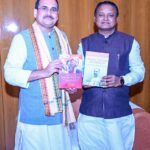How Nehru targeted his opponents
- By : Dr Anirban Ganguly
- Category : Articles

Nehru targeted Dr Syama Prasad Mookerjee and Dr B R Ambedkar, leaders who had shaped India’s Constitution but differed with his vision for the nation
As the campaign for the first general elections in 1951-1952 played out, the Congress led by Nehru fiercely targeted two leaders. For the fledgling Jana Sangh and Dr Syama Prasad Mookerjee, Nehru came out in open abuse, vowing to ‘crush Jana Sangh.’ For Dr Ambedkar and the Scheduled Caste Federation, the Congress adopted a ruse.
Nehru deputed his trusted communist friends to ensure Babasaheb’s defeat. Jawaharlal was essentially a petty man when it came to his political and intellectual opponents. It did not matter to him that they were his colleagues in the Constituent Assembly till the other day and had contributed to erecting the constitutional edifice of free India.
He wanted both Ambedkar and Syama Prasad defeated. He was allergic to their parliamentary skills and to their vocal advocacy of a new polity for India. He wanted a new Parliament shorn of opponents, except communists, who, in any case, were his ideological co-travellers. Nehru did not put up a candidate against A K Gopalan in Kannur. This camaraderie overflowed especially after Sardar Patel’s death. Despite Nehru’s flame-throwing blitzkrieg Dr Mookerjee won his Calcutta south seat, with his Jana Sangh just about managing to stay afloat as a national party.
Babasaheb lost from Bombay North seat, primarily because of the machinations of the communists who were outsourced by Nehru to carry out the hit-job against him.
It did not matter to Nehru that Dr Ambedkar’s health was failing restricting his mobility. It did not matter to him that Dr Ambedkar had completely exhausted himself in the gargantuan task of putting together the Constitution and was therefore worthy of a noble gesture of support. Speaking of his defeat, Dr Ambedkar, one of his most authentic biographers Dhananjay Keer tells us, felt that it ‘was due to the machinations of S.A.Dange.’
During the campaign Dange had given out a vicious slogan, he said, ‘Spoil your votes but don’t vote Dr Ambedkar.’ To Dr Ambedkar, Communism, was ‘like a forest fire; it goes on burning and consuming anything and everything that comes in its way.’ Nehru deftly fanned that forest fire. Dr Savita Ambedkar, in her reminiscences of her life with Dr Ambedkar, recalling this first election writes how Nehru was ‘keeping a sharp eye on the constituency’ and of how ‘S K Patil (Mumbai boss of the Congress) and S A Dange of the Communist Party had agreed.’’
It emerged, writes Savita Ambedkar, that ‘Nehru, S K Patil and Dange had decided that they would do all that was required, use whatever strategy suited the occasion, but they were determined not to let Dr Ambedkar win.’ The Congress-Communist conspiracy, as Savita Ambedkar describes it, left ‘the Constitution-making Doctor Saheb defeated.’ It was a terrible psychological blow for Saheb…
It was Congress’s manipulation that caused the defeat of the maker of the Indian Constitution.’ This first defeat, deliberately inflicted on Dr Ambedkar, deeply disappointed him since he was looking forward to returning to Parliament. Parliament, he felt, was his natural arena of work, a forum standing on which he could give his best to his country’s regeneration in his remaining years. ‘This horrendous defeat in the elections,’ writes Savita Ambedkar, ‘had an extremely harmful impact on his already debilitated health, melancholy, disappointment, depression and disability returned.’
Nehru and Congress engineered a second electoral defeat when Babasaheb lost the by-elections to Lok Sabha from the Bhandara seat. For this election, Babasaheb chose a young RSS pracharak Dattopant Thengadi as his election convener.
Thengadi would closely work as Babasaheb’s understudy for the next two years and would go on to found the world’s largest trade union movement Bharatiya Mazdoor Sangh. The Bhandara by-elections were a chance for the Congress to make amends and to give up its pettiness, but Nehru stuck to his blind opposition to Babasaheb.
Dr Savita Ambedkar, ruefully writes that the Congress ‘should have displayed the largeness of heart to re-invite [to Parliament] the sculptor of the Constitution with due honour. For the sake of the welfare of the nation, if not for anything else, Nehru should have left the way open for Saheb to be elected to the Lok Sabha. But quite to the contrary, the Congress shook hands with a person like Dange and applied all its strength and got into all kinds of machinations to defeat Saheb, which proves that Congress cared more for the party than for the welfare of the country.’
During the Bhandara elections, Dr Ambedkar writes Keer, was scathing of Nehru and Congress. He was fighting the elections, he said, ‘so that he might give the people the other point of view from the Opposition. It would not have been difficult, he said, for him to be in Parliament if he was prepared to make ca ompromise with the Congress.’ Babasaheb firmly chose not to compromise or succumb before Congress and thus faced political humiliation and insult in his last years.
When Nehru’s heirs, thus, comically wield the Constitution today, they must be greeted with loud guffaws. Their action needs to be dismissed as the irrelevant and desperate posturing of the managers of a defeated political cartel.
















